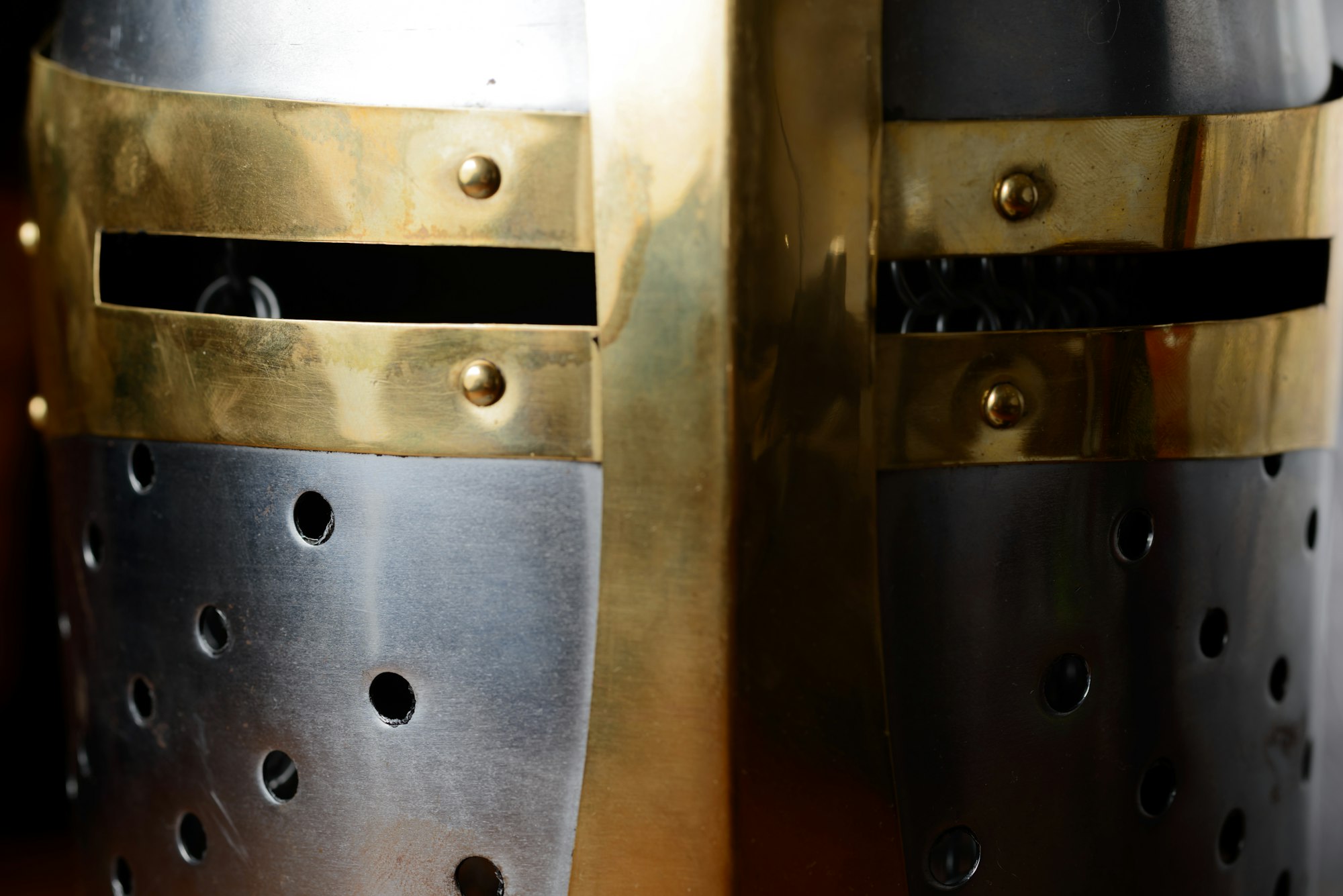Breaking Down the Dungeons & Dragons Character Sheet — Part 7
The final part of this explanatory series, where we look at the marvelous miscellaneous minutia of writing up a character sheet.

So, you’ve got a character sheet. You’ve got abilities and skills, hit points, combat stats, spells, and an inventory. It looks like you’re ready to hit the road, which is why today’s part — part 7 in this D&D character sheet-building series — is the last one.
In this part, we’re going to cover the bits and bobs that I missed in the previous pieces. Then, you’re on your own. It’s nearly time for session 1, so let’s dive in.
Details and Descriptions
So a big part of the character sheet that I completely avoided was the section detailing physical and personal descriptions of the character. This part is where you’ll fill in the “who” rather than the “what” of the character you’re playing.
The physical description is kept fairly simple: age, height, weight, and the colors of their skin, hair, and eyes. There’s usually also a space for you to write in a more detailed description if you want to. Does your character have any interesting scars? Are they gnarled from some horrible accident, or unnaturally beautiful? Do they have any strange birthmarks? This is where you write it all down.
The personality descriptions are there to establish who they are on a more personal level — you can write down your character’s faith, alignment, ideals, and flaws. You’ll also write down any personal bonds they have, their allies and enemies, and any organizations they’re associated with.
You should definitely take some time to write all of this down when you’re first making a character; they’ll help you get into the roleplay a little easier. How would a short character handle a long jump, or a tall character handle a low-roofed inn? Would an extremely religious character be okay with drinking, or a completely atheist character uncomfortable in a church? Think about how this character’s past would affect their present mindset.
Picking a Background
Believe it or not, your background isn’t just the ten sheets of elaborate story you give your DM to set up the level 1 character you love. No, your background is actually an important part of character building; it can affect your abilities, give you boons (or little curses), and inform how you play.
There are 16 backgrounds listed in the Player’s Handbook.
- Acolyte means you were part of a devoted church. You get Shelter of the Faithful, meaning that you and your party can use any temple to your god free of charge — which is great when you’re in need of healing and a place to stay away from vampires.
- Charlatan means that you’ve masqueraded as whatever people want to believe you are rather than what you actually are. You get False Identity, which means that you’ve got a go-to disguise you can use complete with forged documents. You’re also able to forge documents as long as you know what they’re supposed to look like. Rogue’s best friend, anyone?
- Criminal/Spy is pretty straightforward. You were on the bad side of life, as a robber or a smuggler or even a killer! You get Criminal Contact — someone you can get in touch with who won’t ask questions about why you want certain information or a certain task done.
- Entertainer means that you…well, entertained! You can act, sing, or perform some kind of cool trick that people like to watch. You get By Popular Demand, meaning that you’ve got a way of getting free room and board when you perform. Pair this with Bard and you’re golden.
- Folk Hero is your go-to if you like writing epic backstories where you’ve already done a cool thing in the past. You get Rustic Hospitality, which means that pretty much any commoner will be willing to offer you bread and board due to your reputation. They may even hide you from the law!
- Gladiator is a background more similar to Entertainer than it is to Soldier in that you’re skilled in showing off martial prowess. You also get By Popular Demand.
- Guild Artisan/Merchant is exactly what you think it is — you run a shop! You get Guild Membership, which means that you get all the benefits that come with being in a guild, from accommodations to discounts on goods to political connections and more. For a price, of course.
- Hermit means you’ve been living on the edge of society, whether by choice or…well, not. You get Discovery; you’ve found something in your seclusion that no one else has, be that a physical site or a metaphysical secret. This one offers a fun collaborative opportunity for you and your DM to build out the world.
- Knight is for those who want to be wealthy, powerful, and good in a fight. You might be a new noble given the title for a great deed or come from a long-standing line of knights. Think King Arthur for inspiration. You get Retainers, which means that you’ve got up to three family servents who can perform mundane tasks for you like doing your shopping or maintaining your equipment.
- Noble is one of the most common backgrounds I’ve seen from the PHB. You’re part of the upper class, whether or not you accept that. You get Position of Privilege, which lets you mingle with high society — you look like you deserve to be there and can act as such.
- Outlander is for the people who want to play it like they’re mountain men. You don’t deal with society, by choice, and aren’t keen on modern tech. You get Wanderer, which lets you get really good at geography and become functionally a walking map for useful things like food and water.
- Pirate is…I mean, c’mon, it’s Pirate. Yar har har and a bottle of rum and such. You get Bad Reputation, meaning people are afraid of you and show you the respect you deserve because of it. If you want to get away with murder (maybe literally), this is the background for you.
- Sage is for those who want to play someone super book-smart, especially in a specific expertise range. You get Researcher; you’re really good at digging up academic dirt, and can work your way around pretty much any library or archive.
- Sailor is for people who want to play Pirates, but legal. Just kidding (mostly); Sailors of all kinds roam the seas and love it there. You get Ship’s Passage, meaning you can get yourself and your party onto any sailing vessel you want, provided you’re willing to work for it or make some concessions when it comes to the route.
- Soldier is another super common background; you worked in a militia or official army, served in a war, and know how to take control on a battlefield. You get Military Rank, which lets you take charge over soldiers of a lower rank to get intel, equipment, a place to stay, or backup.
- Urchin means you’re basically Aladdin — street rat, scoundrel, no-good kid in the alleys. You get City Secrets, which lets you know exactly how to move through a city quickly and easily and spot things others might miss.
Each background also comes with characteristic suggestions, to help you incorporate it into your playstyle.
Feats
Once you’ve got everything else worked out with your character, you can add Feats. Feats are basically extra skills and features (hence the name) that your character picks up as the adventure progresses.
At certain levels — for most classes it’s 4, 8, 12, and 16 — you can choose between an Ability Score Increase (adding 2 points to the ability scores of your choice) or a feat. Rogues and Fighters get an extra ASI opportunity, so can end up with one more feat than the others. Variant Humans also get a feat for free at level 1.
Your DM may also let you take a feat for in-story actions. Say for instance your character was blessed by a god with excellent powers of perception; they might gain Observant or Keen Mind. Your character might give a rallying speech so good that their teammates are able to win an otherwise impossible fight, gaining them Inspiring Leader. They might spend months dedicating themselves to understanding the local culture and learning several new languages using the Linguist feat. I really like the idea of rewarding players for interesting, innovative, or particularly dedicated roleplay by offering them mechanical boons.
And what boons they are! There are way too many feats to list off here, so let’s just talk about what they can do. Feats can let you:
- Gain proficiencies with certain skills, ability checks, saving throws, or tools
- Increase your ability scores
- Improve your initiative score
- Gain resistances or immunities to certain types of damage or magical effects
- Gain extra abilities that otherwise wouldn’t be allowed like canceling reactions, stopping movement, preventing attacks, etc.
- Gain magical abilities otherwise unavailable to them
These and so many other abilities are why feats are some of my favorite ways to beef out my characters.
Congratulations, Your Sheet is Done!
So, there you have it. You’ve got an entire, finished character sheet for a playable, interesting Dungeons and Dragons Fifth Edition character. They have abilities, an appearance, a background, and traits that set them apart. They are decked out in the most appropriate equipment you can give them. They’re ready to dive into the adventure headfirst.
Now comes the hard part: bringing that character to life.
See, you can know exactly how to create the optimal build and a character that’s fascinating on paper, but what makes or breaks that character in the game is how you play them. You could sit two groups of people down at two identical tables with identical sheets for the same adventure — and still get two completely unique campaigns. What you choose to do with those scores, that background, that physical description, those combat stats, that inventory, is what will make the story come alive around you; without your interpretation, the character is nothing but a bunch of numbers.
So make interesting characters. Make basic characters. Make one character and play them over and over again. Make a thousand characters you’ll never play just because you have that many stories in your head. Do whatever you want when you’re building because when it comes down to it, building your sheet is just the first step in playing this awesome game full of magic, mystery, adventure, comradery, tragedy, comedy, and straight-up fun.
